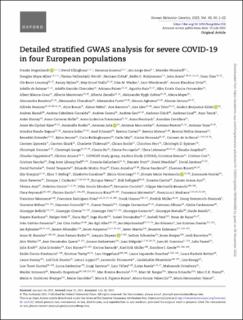Detailed stratified GWAS analysis for severe COVID-19 in four European populations
Degenhardt, Frauke; Ellinghaus, David; Juzenas, Simonas; Lerga-Jaso, Jon; Wendorff, Mareike; Maya-Miles, Douglas; Uellendahl-Werth, Florian; ElAbd, Hesham; Lenning, Ole Bernt; Myhre, Ronny; Vadla, May Sissel; Holten, Aleksander Rygh; Kildal, Anders Benjamin; Lind, Andreas; Dyrhol-Riise, Anne Ma; Hoff, Dag Arne Lihaug; Müller, Fredrik; Solligård, Erik; Holter, Jan Cato; Afset, Jan Egil; Damås, Jan Kristian; Bergan, Jonas; Risnes, Kari; Muller, Karl Erik; Tonby, Kristian; Heggelund, Lars; Gustad, Lise Tuset; Grimsrud, Marit Mæhle; Dudman, Susanne Gjeruldsen; Folseraas, Trine; Skogen, Vegard; Hov, Johannes Espolin Roksund; Karlsen, Tom Hemming; Rühlemann, Malte C.; Arora, Jatin; Özer, Onur; Wacker, Eike Matthias; Wienbrandt, Lars; Ortiz, Aron Blandino; de Salazar, Adolfo; Chercoles, Adolfo Garrido; Palom, Adriana; Ruiz, Agustin; Garzia-Fernandez, Alba-Estela; Blanco-Grau, Albert; Mantovani, Alberto; Zanella, Alberto; Mayer, Alena; Bandera, Alessandra; Franke, Andre
Peer reviewed, Journal article
Published version
Permanent lenke
https://hdl.handle.net/11250/3030813Utgivelsesdato
2022Metadata
Vis full innførselSamlinger
- Artikler [5068]
- Publikasjoner fra CRIStin FHI [7544]
Sammendrag
Given the highly variable clinical phenotype of Coronavirus disease 2019 (COVID-19), a deeper analysis of the host genetic contribution to severe COVID-19 is important to improve our understanding of underlying disease mechanisms. Here, we describe an extended genome-wide association meta-analysis of a well-characterized cohort of 3255 COVID-19 patients with respiratory failure and 12 488 population controls from Italy, Spain, Norway and Germany/Austria, including stratified analyses based on age, sex and disease severity, as well as targeted analyses of chromosome Y haplotypes, the human leukocyte antigen region and the SARS-CoV-2 peptidome. By inversion imputation, we traced a reported association at 17q21.31 to a ∼0.9-Mb inversion polymorphism that creates two highly differentiated haplotypes and characterized the potential effects of the inversion in detail. Our data, together with the 5th release of summary statistics from the COVID-19 Host Genetics Initiative including non-Caucasian individuals, also identified a new locus at 19q13.33, including NAPSA, a gene which is expressed primarily in alveolar cells responsible for gas exchange in the lung. Detailed stratified GWAS analysis for severe COVID-19 in four European populations
